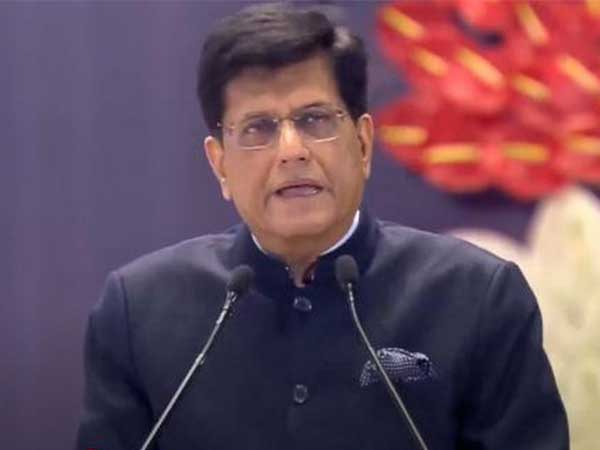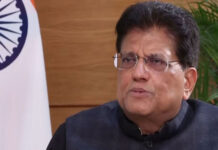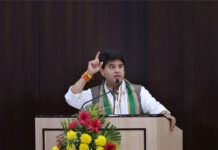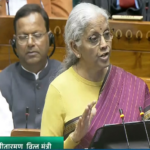Union Commerce Minister Piyush Goyal described the Free Trade Agreement (FTA) between India and the United Kingdom as a “fantastic” development, emphasizing that the deal opens up extensive opportunities for India while fully protecting its key interests.
Goyal highlighted that the agreement has excluded sensitive sectors, such as dairy, rice, and sugar, which are crucial for farmers and Micro, Small, and Medium Enterprises (MSMEs), from its scope to ensure their protection.
“A fantastic FTA has been signed between India and the UK today under the leadership of Prime Minister Narendra Modi. This agreement opens multiple opportunities for India while safeguarding all our interests. Key sectors sensitive to India, like dairy, rice, and sugar, have been kept out to protect our farmers and MSMEs. At the same time, we’ve prioritized the areas where India stands to benefit from imports from the UK,” Goyal told ANI.
He added that labour-intensive industries such as textiles, footwear, leather, toys, furniture, and pharmaceuticals will gain new market access in the UK, leading to significant prospects for Indian workers, women, and farmers.
Goyal also highlighted a new provision that allows Indian workers temporarily employed in the UK to deposit their earnings into their Provident Fund accounts in India, helping them retain their savings and avoid earlier losses of up to 25% due to lack of access to social security benefits.
“India is competitive in several labour-oriented sectors. The agreement lowers duties and improves market access in areas like textiles, leather, toys, furniture, and pharmaceuticals. Workers, farmers, women, and MSMEs will greatly benefit. Additionally, Indian workers on short-term assignments in the UK will now be able to transfer social security contributions back home to their PF accounts, turning what was previously a financial loss into savings,” he said.
Goyal confirmed that while India’s Cabinet has already approved the agreement, it still needs parliamentary clearance in the UK, which could take a few months. However, the certainty around the deal enables businesses on both sides to begin preparations around supply chains and regulatory approvals. He expressed optimism that bipartisan support in both countries would ensure swift implementation.
India and the UK have formalized a major economic partnership with the signing of the Comprehensive Economic and Trade Agreement (CETA), led by Prime Minister Modi. The deal was signed by Commerce and Industry Minister Piyush Goyal and UK Secretary of State for Business and Trade Jonathan Reynolds, in the presence of both nations’ Prime Ministers.
This FTA marks a landmark in India’s engagement with developed economies, reflecting both countries’ commitment to deeper economic integration. As the fourth- and sixth-largest economies globally, stronger bilateral ties between India and the UK carry substantial global economic weight. The agreement follows the conclusion of negotiations announced on May 6, 2025. Bilateral trade between the two nations currently stands at approximately USD 56 billion, with a shared aim to double this figure by 2030.
CETA offers duty-free access for 99% of Indian exports to the UK, covering nearly all traded goods. This is expected to significantly benefit labour-driven sectors such as textiles, marine products, leather, footwear, toys, sports goods, and gems and jewellery, as well as rapidly growing segments like engineering goods, auto components, and organic chemicals.
The services sector, a major contributor to India’s GDP, is also set to benefit. The deal enhances market access in IT and IT-enabled services, legal and financial services, education, and digital trade.
Indian professionals—including those sent on company assignments, and those working under contractual roles such as architects, chefs, engineers, yoga instructors, and musicians—will gain from simplified visa processes and more flexible entry rules, making it easier to work in the UK.
A significant achievement under CETA is the agreement on the Double Contribution Convention. This allows Indian professionals and their employers to avoid making social security contributions in the UK for up to three years, enhancing the global competitiveness of Indian talent.
The agreement aims to promote inclusive trade. Women and youth entrepreneurs, MSMEs, farmers, fishermen, and startups will gain better access to global value chains, backed by measures that support innovation, sustainable practices, and reduced non-tariff barriers.
CETA is expected to substantially boost trade in the coming years, creating jobs, increasing exports, and deepening the economic ties between India and the United Kingdom.
















[…] Source : Chinimandi […]